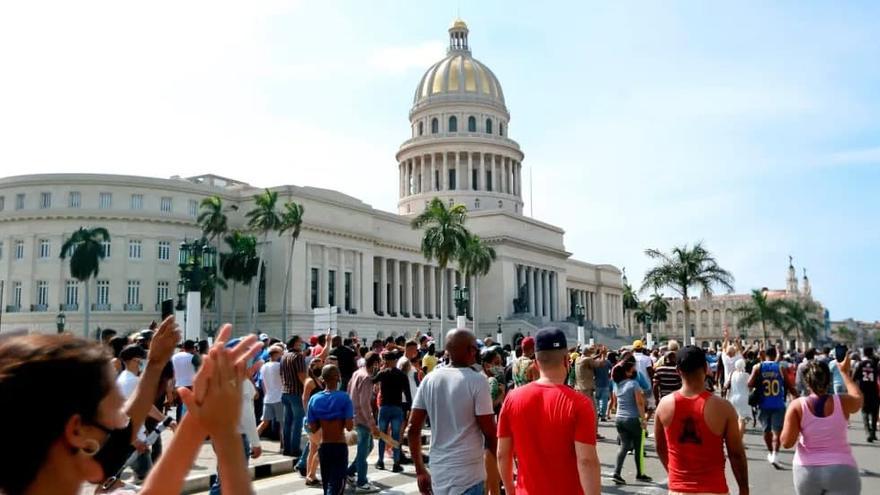
![]() 14ymedio, Havana, 21 September 2021 — With the reopening of tourism and schools, scheduled for the middle of November, a way is opened to the reactivation of citizen protests. A group of artists and intellectuals who participated in the spontaneous demonstrations on July 11 has requested authorization for a march against violence on Saturday, November 20, in which they plan to demand that the rights of all Cubans be respected, the release of political prisoners and the solution of differences through democratic means.
14ymedio, Havana, 21 September 2021 — With the reopening of tourism and schools, scheduled for the middle of November, a way is opened to the reactivation of citizen protests. A group of artists and intellectuals who participated in the spontaneous demonstrations on July 11 has requested authorization for a march against violence on Saturday, November 20, in which they plan to demand that the rights of all Cubans be respected, the release of political prisoners and the solution of differences through democratic means.
The group meets under the name of Archipelago and is led by the playwright and actor Yunior García Aguilera. The letter presented to the authorities on Tuesday is signed by the filmmaker Raúl Prado Rodríguez, the actor Reinier Díaz Vega and the editor Miryorly García Prieto, among others.
The march, if approved, will run along the Paseo del Prado, from its beginning on the Malecón avenue, in Old Havana, to Monte Street, passing by the statue of José Martí in Central Park, where they will deposit a floral offering and a few yards later they will also hold a rally in front of the National Capitol, the seat of the Cuban Parliament.
The signatories have sent the petition to Reinaldo García Zapata, governor of Havana, and Alexis Acosta Silva, mayor of the Old Havana Administrative Council. In it they state that the Universal Declaration of Human Rights guarantees the right to freedom of peaceful assembly and association.
The document’s signatories also note also that the Cuban Constitution of 2019 “recognizes” the rights of assembly, demonstration and association for lawful and peaceful purposes; and that no law in force in Cuba prevents or limits the ability to march.
For these reasons, they request that the act be allowed to take place, which would last approximately three hours and can accommodate, they estimate, some 5,000 protesters. “We make this request with enough time in advance for its approval. If we do not receive a timely, pertinent and well-founded response, we will consider this request approved,” they announce.
The applicants insist that they are committed to guaranteeing the peaceful nature of the march and that they will maintain the anti-covid measures that are required, but they also ask that, in return, not only the demonstration be allowed to take place, but also to keep telecommunications open and not restrict citizens’ freedom of movement.
The authorities usually place patrols at the homes of activists or journalists when they know that there is a formal or informal convocation and, on occasions, they prevent them from leaving their homes or, directly, they take them to the police stations if they try to break through that cordon.
In addition, cuts in the internet — in order to prevent the dissemination of information or moving images of the protests — are common, as happened on July 11th and 12th during anti -government protests, in which there were more than 700 arrests, as well the death of the man. Etecsa’s mobile network was not working normally for at least three days.
The request is being made two months in advance and for a date on which not only international travelers might have returned and schools could be open, and some recreational and food services might be back in operation if the data on covid-19 infections improves.
This was indicated this Monday by Manuel Marrero, who asked that the reopening on the island be gradual depending on the data for each territory. The prime minister said Monday that local authorities should prepare the design of their strategies and added that where the epidemiological situation is bad there will not be an opening “for now.”
This Tuesday, the Ministry of Public Health announced 63 deaths and 8,289 new cases of coronavirus. The percentage of positivity rises once again to 16% and in some provinces it is extremely high, such as Sancti Spíritus (36.2%), Camagüey (35.7%) and Pinar del Río (26.8%).
____________
COLLABORATE WITH OUR WORK: The 14ymedio team is committed to practicing serious journalism that reflects Cuba’s reality in all its depth. Thank you for joining us on this long journey. We invite you to continue supporting us by becoming a member of 14ymedio now. Together we can continue transforming journalism in Cuba.
